Junior Olympics: A Welcome Reprieve
- Details
- Written by Krsna Kay
- Hits: 5359
 The announcement of Junior Olympics at Scarsdale High School broke like camp color war. In the past, the event was pre-scheduled on the school calendar and led to too much partying the night before. To avoid this tradition, the SHS administration told students to be prepared for a surprise announcement that was made on Tuesday May 28th. With just a half hour to prepare, students dressed in their elementary school colors and went out to the field to enjoy leapfrog, dodge ball and a tug of war under steamy skies –- culminating in a trip to the ice cream truck.
The announcement of Junior Olympics at Scarsdale High School broke like camp color war. In the past, the event was pre-scheduled on the school calendar and led to too much partying the night before. To avoid this tradition, the SHS administration told students to be prepared for a surprise announcement that was made on Tuesday May 28th. With just a half hour to prepare, students dressed in their elementary school colors and went out to the field to enjoy leapfrog, dodge ball and a tug of war under steamy skies –- culminating in a trip to the ice cream truck.
School Psychologist and Junior Class Advisor Ernie Collabolletta, who organized the day with Jessica Levenberg said, "The announcement came at 11:45 and the juniors were summoned to group with their elementary school buddies. By 12:30 over 350 juniors met on the Brewster Road side of the school and the games began. Teams were involved in dodge ball and kick ball. While these teams were battling all different types of relay races such as three legged races, wheel barrel races, balloon toss, pie eating, and tug of war. In the end, Fox Meadow outperformed their elementary school rivals with Quaker Ridge following behind them.The Junior class had a wonderful competing yet bonding with each other.
A parent of a high school junior said, "I am glad the juniors had a fun break from all the pressure this time of year. There is so much testing particularly for them over the next couple of weeks. This class seems to know how to take a break and just have fun."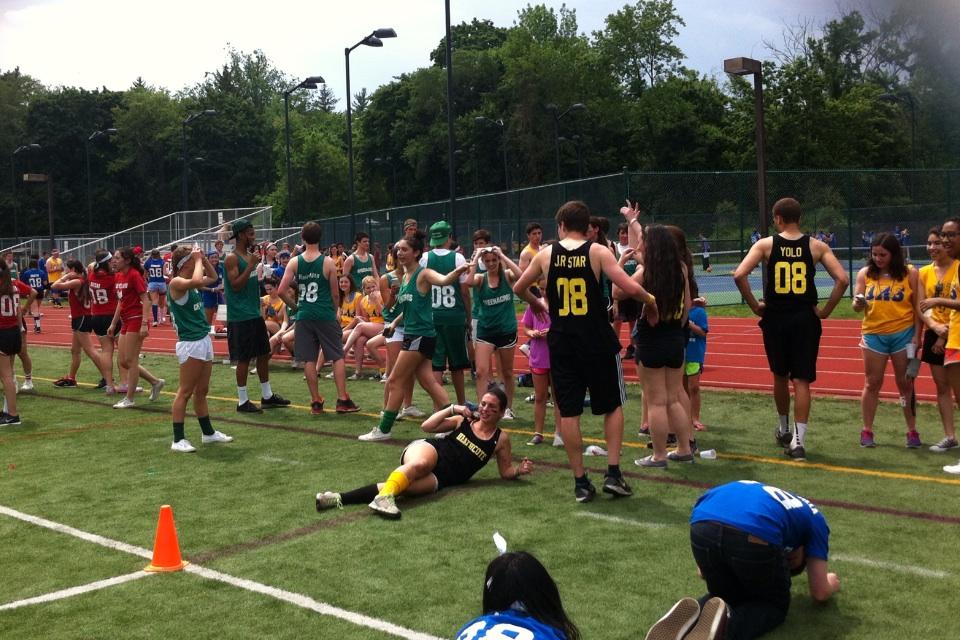
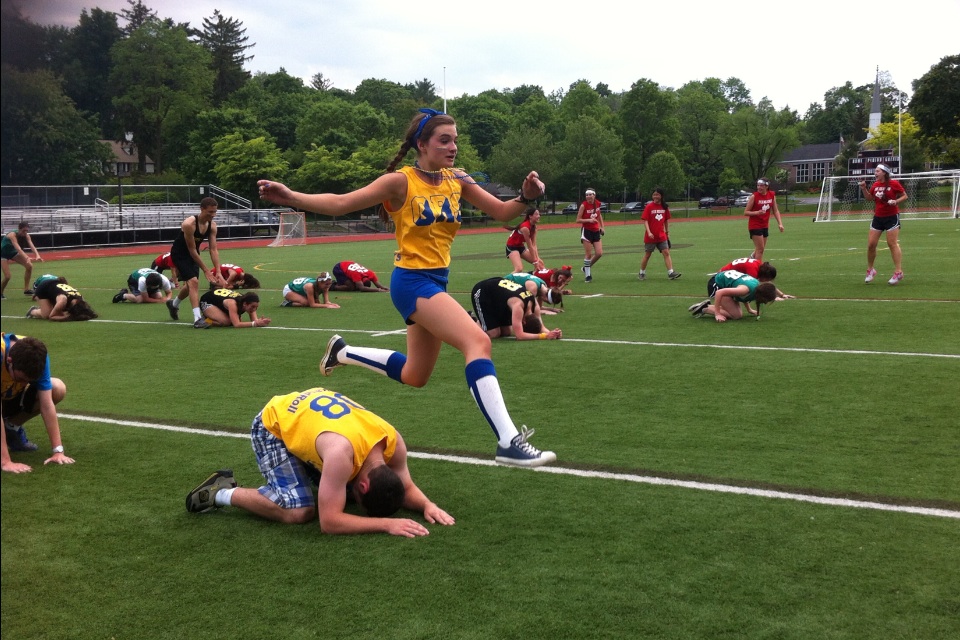
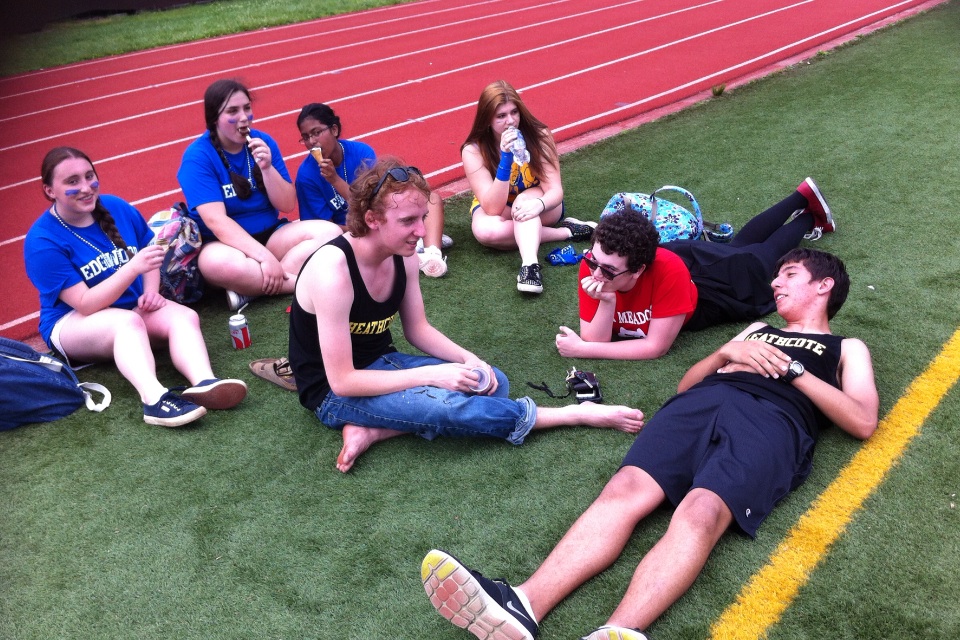


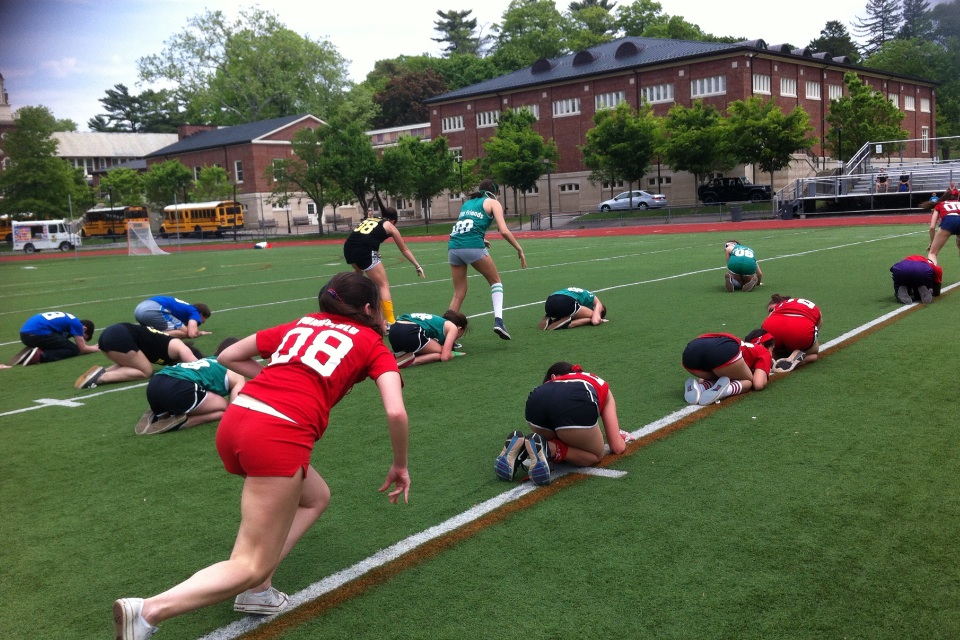

What I Learned on College Night
- Details
- Written by Megan Shelton
- Hits: 4824
 While some of my friends said they didn't find out anything new about college admissions at Scarsdale High School's Annual College Night on May 15, reflecting on what I heard, I was reminded of some important information. Admissions counselors from Tufts University; Ursinus College; SUNY Binghamton; Sacred Heart University; Hamilton College; Yale University; Indiana University, Bloomington; Washington University in St. Louis; and University of Rochester came to talk to parents and students about standardized testing; essays and supplements; resumes; and many other aspects of the college admissions process.
While some of my friends said they didn't find out anything new about college admissions at Scarsdale High School's Annual College Night on May 15, reflecting on what I heard, I was reminded of some important information. Admissions counselors from Tufts University; Ursinus College; SUNY Binghamton; Sacred Heart University; Hamilton College; Yale University; Indiana University, Bloomington; Washington University in St. Louis; and University of Rochester came to talk to parents and students about standardized testing; essays and supplements; resumes; and many other aspects of the college admissions process.
Since not everyone is fortunate enough to visit every college to which they want to apply, it was good to have the admissions officers come to us and consolidate much of what we needed to know into a one-night session.
So even though you may feel you know everything, it is nice to have it all reiterated to you by the people that matter most ... the admissions officers who have the final say. Here is a list of some important aspects of what the admissions counselors (re)taught the audience at College Night ... Attention juniors who couldn't make it, parents who want to offer some advice to your sons and daughters, and underclassmen who are looking ahead to college:
1. You are NOT your test scores. This cannot be emphasized enough, especially in Scarsdale where there pressure to get high scores, and peer pressure to equal or better your friends test performance. The admissions counselors understand that on any given day the test might have been especially hard or the flu might have been going around. However, they also know that there are many great things about you that make up for "bad" test scores.
2. College admissions offices love seeing upward trends on your standardized tests and on your transcript. Junior year is the last full year that your grades truly matter, so focus on keeping your grades high throughout the year.
3. For all the athletes out there: if you are being recruited to a school (or hope to be recruited) make sure you spend as much time talking to the schools' admissions office as you do with the coaches. While a college coach may like you and advocate for your admission to the school, the Admissions Office not the Athletics Department has the final say regarding your acceptance.
4. We all know that extra-curriculars are a major aspect of your resume, but most colleges value your participation in just one club in which you hold a major position rather than seven different clubs in which you have no ranking and minimal participation. Your years in high school give you time to pursue your interests, so find what it is that you enjoy doing and stick with it.
5. Your essay can make or break your admission to a college. When writing your essay, be as creative as you wish, but be sure that it has underlying meaning. Also keep in mind that you never know who will be reading your essay so make it appealing to a wide range of readers.
6. If a college offers evaluative interviews and you feel that you are personable schedule one. Interviews are a great way for an admissions counselor or a representative from the college (alumni, etc.) to get to know you off paper.
7. When picking what colleges you want to apply to, remember to keep an open mind you may be surprised.
8. Visit as many college campuses as you can. Seeing a college and the people who attend it as well as the clubs and programs offered there is a totally different experience from reading about the college in a guide. At some (but not many) colleges, such as Sacred Heart University, you cannot even apply unless you have visited the campus, so keep this in mind. While most colleges are very forgiving and will not usually count it against you if you did not have the opportunity to visit (if it is far away, etc.), schools you apply to that are much closer (for example Hamilton, since Hamilton's representative specifically mentioned this fact) would definitely prefer if you visited.
And finally...
9. Remember to take time to de-stress from this pressured process. Junior year is undoubtedly a tough one, but it is important to allow yourself to take some time to forget the stress and relax.
While I am only a junior in high school and definitely not an expert, I have learned a lot this year regarding the college process through researching the schools, attending college panels and visiting to a significant number of campuses. I hope this advice helps. Good luck in your search.
Megan Shelton is a junior at Scarsdale High School who loves to write. She spends her free time writing, reading, exercising, hanging out with friends, and doing work for the Epilepsy Foundation Club, the American Red Cross Club and the Juvenile Diabetes Research Foundation Club.
SAT/ACT Tutors: Are They Necessary?
- Details
- Written by Stacie M. Waldman
- Hits: 16132
 Sometime during junior year of high school, (and in some cases earlier,) parents and their college-bound offspring begin to navigate the complexities of getting into college. As many schools depend heavily on test scores to select potential students one of the questions faced by parents and student is how to best prepare for the SAT/ACT.
Sometime during junior year of high school, (and in some cases earlier,) parents and their college-bound offspring begin to navigate the complexities of getting into college. As many schools depend heavily on test scores to select potential students one of the questions faced by parents and student is how to best prepare for the SAT/ACT.
Everyone knows that a four-year college can come with a hefty price tag, but what are people willing to spend for SAT/ACT test preparation in order to give their child the best odds of acceptance to their top-choice school? And if one is willing to or has to spend large sums of money for private tutoring, is it worth it? How to decide if a student would most benefit from a private SAT tutor or a group class, or even just independent work with a book? What are some of the options and what are their costs?
Scarsdale High School has a document available on the school website entitled "Some thoughts on SAT/ACT preparation." The school's official recommendation for test preparation is to start 8-12 weeks prior to the exam, not six months to a year in advance as the tutoring companies I spoke with suggested. The document urges parents to "help your youngster keep this test in perspective," and says, "While the SAT/ACT is important in the admission decision, it is not as important as good grades and strong academic coursework". Private SAT tutors and college counselors do not necessarily concur. One SHS Dean does not agree with this either according to a parent who claimed, ""One year, one of my children's deans emphasized the SAT score for college, but another year my other child's dean told me that the SAT score was secondary to many other credentials." Alex Weiner, President of Breakaway Prep, a tutoring and college advising firm, feels strongly that, "...the SAT/ACT score is more important now than ever. When you apply to a college, what does an 'A' at SHS mean versus an 'A' at a high school in St. Louis?" Standardized tests truly standardize all students from all schools."
The three types of study methods that can be used to prepare for the SAT/ACT include independent work, a group prep course and private tutoring (or a mix of these). According to the SHS document on SAT prep, the factors that should influence parents' decisions about what type of prep work their child needs include:
• Does your child work well independently?
• Does your child need additional work in a specific test area?
• Will your child do assigned work?
• Does your child have a very busy schedule and/or limited transportation?
• Is the desired test preparation type feasible from a cost perspective?
After answering the above questions, parents and students may have a better understanding of their child's needs and can go from there. Mr. Wiener recommends the "Official Guide to SATs", for the independent learner. It is currently on sale at Amazon for $16.41. "In 23 years of recommending that book," said Mr. Weiner, "I've seen it work really well for three students." The cost of the book is equivalent to about five minutes of private tutoring with Breakaway Prep, or less than two minutes with one of the top-tier tutors from a very popular SAT tutoring center called Advantage Testing. A book, therefore, is the lowest cost, no risk option for SAT prep and a good starting point for many students.
For a student less motivated to work independently, a small-group prep course can help structure the studying process. Group classes offer equal amounts of time to each of the areas of the SAT/ACT and don't individualize the instruction. These courses run around $1,000 for 10 sessions and are offered through Kaplan, Princeton Review, and the JCC of Mid-Westchester, for example.
Karen Ceske, an SAT tutor in the Scarsdale area, thinks group courses are a great option in terms of affordability and says that a motivated child will do well in a group class. However, she cautioned parents to ask how many students are in a class, who isteaching and whether the class will be divided by ability. Some students will do a group class and then supplement that with some private tutoring sessions after identifying areas of need. Mock test taking facilities have also popped up, such as Bespoke in Irvington. Bespoke offers private tutoring as well. SHS's official word is: In preparing for the SAT/ACT, students should familiarize themselves with the format of the test, the expectations and the timing. When a student takes mock exams, make sure they are timed. Learning time management techniques is one of the most useful tools for successful test taking.
Mr. Weiner has seen the popularity of group classes trending downward and private tutoring trending upward in Westchester. "Students these days have busy schedules and private tutoring can be a better fit for them," he said. "I'm like their workout coach. Private tutoring is more money but can be much more effective." Mr. Weiner sees it as buying a high-level service and this type of service exists in affluent areas like Westchester, Beverly Hills, and Tokyo, as per his examples. He went so far as to say, "This could be a game changer for some kids if their parents can afford it." If they can't afford it, Mr. Wiener's Breakaway Prep does do some pro bono work with the White Plains Youth Bureau on a reduced-fee basis. Ms. Ceske acknowledged that a private tutor offers benefits like tracking students' needs and progress that a group class would not, but noted that the cost is a negative.
Of the Scarsdale parents I spoke with, about half thought what they have spent on SAT tutoring has been worth every penny; the other half felt like tutors weren't generally all that helpful in increasing their kids' SAT scores and it didn't matter in the long run anyway. One parent said that their dean made it seem like every additional point on the SAT means something significant for the college-bound student while another said that their dean emphasized other attributes in addition to SAT scores for college admission such as grades and leadership.
A Scarsdale mom who has been through the SAT test taking process with her kids twice and spent tens of thousands of dollars on tutoring and college advising for her kids justified the expense. "We live in a town where people go into Neiman Marcus and drop $15,000 on a handbag," she noted, "so why wouldn't we spend this much to give our kids the best chance at getting into their dream school?" She used Advantage Testing both times and felt like it was worth it. Her first child was a great student and only did Advantage for a couple of months- she got into her top school. Her second child was not as good a test taker and had a private tutor through Advantage for an entire year. She took the SATs twice and saw a dramatic increase in her scores. She thinks private tutoring gave her kids the confidence to go into the test ready- for a price, of course. Whereas Breakaway Prep charges $180 per hour, Advantage is known to be on the pricier side.
Advantage Testing charges an initiation fee of $1,840 which provides access to their tutors and "materials." From there, their fees range from $390 per 100 minutes to $1,120 per 100 minutes, depending on the experience of the tutor. The representative I spoke with at Advantage recommended students starting tutoring early. "It's a good idea to get a jump start over the summer. That way you can also lock in your tutor at a time that works for your child beginning in the fall," she encouraged. She said that most students come once a week for 100 minutes per session for 6-9 months, or about 20 sessions, so on average, parents lay out between $9,840-$24,240 for tutoring, per child, at Advantage. Some students find that shorter sessions are better and they can do 50 versus 100-minute sessions for half the cost. The tutors at Advantage are professionals (meaning it's their full-time job) and undergo an intensive training and hiring process. Although Advantage said that if a student isn't happy with their tutor they'd happily allow a switch, several parents told me that they found it difficult to request and receive a new tutor when their child wasn't working well with the first (or second, in one case).
Several parents and tutors I spoke with warned against thinking that the most expensive tutor equals the best tutor for their child. "There is the phenomenon that unless you pay expensive rates, you are not getting the best," said one private tutor that has been tutoring for many years. "$750 gets you a very smart person with a great success rate but is that because he/she mainly works with kids who are very smart to begin with? I think it is reasonable to expect to pay around $200 for a tutor. The main thing to remember is that the tutor is not taking the test. Students who do the work, whether for a class, tutor or on their own with a prep book, usually fare the best." In fact, the parent who told me her daughter got into her top school (an Ivy League) said that her friends at college couldn't believe that she had private SAT tutoring. Although it's commonplace in Scarsdale, it's rare in many other locales.
Another SHS parent I spoke with has found the entire SAT preparation and SAT taking process very distressing. Her child has worked with many different test prep companies including Breakaway Prep, Carnegie & Pollock, Advantage Testing, Bespoke, TestTakers, and Study Point. Some she thought were a complete waste of time and money. Most classes her child took were made up of Scarsdale and Edgemont kids, specifically at Bespoke and TestTakers. Additionally, she didn't feel the deans gave enough guidance about when to take the SAT and subject tests.
Do SHS students tend to feel extreme pressure to do well on the SAT and where is this pressure coming from? Mr. Weiner thinks the pressure students feel comes from the lower acceptance rates to premier schools. "The process feeds on itself with web-based applications," he said. "Students can press one button and apply." One parent of current SHS students told me that kids aren't supposed to talk about their test scores, where they are visiting, or where they get in, but social media has made it difficult to uphold this policy. Another parent felt that there is tremendous pressure within SHS to do well on the SAT/ACT and get into a good college, but the pressure comes from students competing amongst themselves, not from the school or parents.
What has been your experience with SAT/ACT test prep? Are there specific group classes you'd recommend or private tutors/tutoring agencies? Do you feel like private tutoring is worth the expense if you've been through it?
Share your thoughts in a constructive way in the comments section below.
The Grumpy Teen: Navigating Your Way Around Your Testy Adolescent
- Details
- Written by Stacie M. Waldman
- Hits: 11937
 If you've ever felt like your teen was allergic to you, you'll be relieved to know that's normal. That's what a large crowd of parents learned on Thursday May 8 when they came to SMS to listen to clinical psychologist Dr. Anthony E. Wolf speak about the challenges of raising teens. Wolf should know because he is the father of two ex-teenagers and has spent a lifetime examining the psychology of children and teens. He earned a Ph.D. in Clinical Psychology from City University of New York followed by twenty-five years in
private practice, where he sees children and adolescents. He is the author of five books on parenting and numerous articles for Child Magazine, Parents, and Family Circle and currently writes a column for the Toronto Globe and Mail. Dr. Wolf has appeared on The Today Show, Fox Morning News, CBS Morning News, and The View as a teen psychology expert.
If you've ever felt like your teen was allergic to you, you'll be relieved to know that's normal. That's what a large crowd of parents learned on Thursday May 8 when they came to SMS to listen to clinical psychologist Dr. Anthony E. Wolf speak about the challenges of raising teens. Wolf should know because he is the father of two ex-teenagers and has spent a lifetime examining the psychology of children and teens. He earned a Ph.D. in Clinical Psychology from City University of New York followed by twenty-five years in
private practice, where he sees children and adolescents. He is the author of five books on parenting and numerous articles for Child Magazine, Parents, and Family Circle and currently writes a column for the Toronto Globe and Mail. Dr. Wolf has appeared on The Today Show, Fox Morning News, CBS Morning News, and The View as a teen psychology expert.
"It is a very humbling experience to be the parent of a teenager," says Wolf. It's psychologically normal for adolescents to essentially develop an 'allergy' to one of both of their parents." He continued by saying, "There is a historic change in the behavior of children with their parents. They talk back more," he added, "and are not as immediately obedient. Kids today do not respect their parents in the way they did in the past." So why is this happening? According to Wolf, kids today are more outspoken because parents are doing something right... by no longer using physical punishment to discipline their children. "The revolution in parenting today is that parents can no longer physically punish their children without potential repercussions; it's no longer acceptable. " According to Dr. Wolf, by the time kids are adolescents, they know this and it makes them less afraid of their parents. Dr. Wolf believes that parenting is truly more difficult today than in the past.
Next, Dr. Wolf gave the example of the "at home versus at school" teenager. Do you have a child that is a nightmare at home but an utter joy and delight to others once they leave the house, including at school? Do you have a child who could fight for two hours about taking out the garbage at home and then steps up to whatever is asked at her friends house?
Dr. Wolf described this phenomenon as the two different versions we all have of ourselves- the home version (or "baby self") and the outside version (or "mature self"). While the baby self at home cannot handle delayed gratification or stress, outside, the mature self can handle much more stress. "In some families," Dr. Wolf cautioned, "the parent who does all the day to day care of the child gets the baby self, and the other parent gets the mature self." He also added, "Parents can say the same exact thing and get very different results." Adults often have a baby self, too. For example, when the kids go to bed, adults often shut down and morph into their own baby selves. This is why it is so stressful when kids get out of bed numerous times after being put to bed- we feel like we're "done."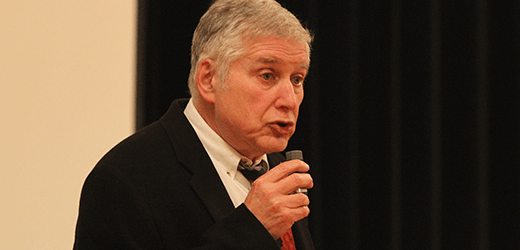
"Would you prefer that baby self come out at home or at school?" Dr. Wolf asked the audience. He quickly pointed out that, "...you can't choose this. The simple act of a parent being present brings out the child's baby self, i.e. the whining, complaining, and noncompliance."
Can you reduce the amount of fussing in your child? Dr. Wolf said yes. "Baby selves don't want stress and want everything now. When they don't get their way, baby selves will go on and on for a very long time- they can't move forward," he said. Dr. Wolf's solution to this is to tell your teen what you have to say in a fast and firm way, and then "RUN! Literally, just disengage as soon as you feel your blood pressure rising." That being said, Dr. Wolf forewarned, it's also important to choose your battles wisely.
How and why do you disengage? "Disengage by saying what you have to say and then stop," said Dr. Wolf. "Anything more is provoking and is not good for the baby self. What baby selves hate more than anything is to separate or walk away." He suggests shutting the argument down as soon as possible even if your teen calls you a nasty word. "At some point, you need to address this," he said, "but do NOT do it at this time." He argues that if you want less of the talking back, this is what will work. "Use this technique and stay consistent with it," he advises.
Dr. Wolf described adolescence as the coming together of four developmental changes at the same time: physical, intellectual, sexual, and the need for independence, "...all of which make this time a struggle." According to Dr. Wolf, teenage boys often remove themselves from family life and it can feel like a wall has descended on their parents.
Teenage girls tend to declare their independence. The climate with teenage girls is usually tenser than with boys, but Dr. Wolf said research shows that girls can be more psychologically healthy as teenagers than boys. "Boys tend to become non-communicative which is worse in many ways--- they can completely shut down," he said, "which can be worrisome."
Dr. Wolf's suggestion for day-to-day teenage grumpiness? "Joke around with them," he said. "Just be goofy and silly sometimes instead of getting mad." And always, always hug them, he added, even if they act like they hate it. "
Dr. Wolf then answered audience questions:
When my teen's "baby self" is banging at the door after I've disengaged, I feel like that brings out my own baby self. What should I do?
Continue to completely disengage.
How do you explain disengaging one child to other siblings?
That's a tough one. Don't try to justify yourself. Just say it's what you're choosing to do with that particular child at that particular moment.
Boys really do seem to shut down. How can you tell the difference between a depressed and a non-communicative, grumpy teen?
Go with you own instincts and if it continues for a long time, seek professional help.
Do teenage girls tend to have a stronger "allergy" to their mothers versus their fathers?
The short answer is YES.
What about teenage sibling rivalry? Can you teach them to disengage each other?
When a parent disengages, some teens learn to provoke a sibling.
Do you recommend going back and talking to your child after disengagement?
Yes, but wait until things are calm to discuss it.
Are there any general rules for tolerating the baby self?
If grades fall or your teen seems miserable or has no friends, that's a red flag. If a worry persists beyond moodiness, seek professional help.
According to Dr. Wolf, "...the best indicator of what child will be like when they grow up is the mature self. Don't look at one slice of your child's life," he warned. "If you're a nice and nurturing parent and take a firm stance at least some of the time --even though your children gets mad at you, the odds are strongly in your favor that your kids will turn out okay." And teens aren't teens
Data Shows Decline in the Number of Young Adults in the Suburbs
- Details
- Written by Joanne Wallenstein
- Hits: 5263
 Both the New York Times and WNYC's Brian Lehrer recently discussed new statistics that show a decline in the number of 25-44 year olds in the suburbs of New York City. According to experts more parents with school-age children are choosing to stay in the city and send their children to city schools than they have in the past. For instance, from 2000 -2011 Rye had a 63 percent decrease in the number of 25 to 34 year olds and a 16 percent decrease in 35 to 44 year olds.
Both the New York Times and WNYC's Brian Lehrer recently discussed new statistics that show a decline in the number of 25-44 year olds in the suburbs of New York City. According to experts more parents with school-age children are choosing to stay in the city and send their children to city schools than they have in the past. For instance, from 2000 -2011 Rye had a 63 percent decrease in the number of 25 to 34 year olds and a 16 percent decrease in 35 to 44 year olds.
There are several theories about what's behind this trend:
Some surmise that the exodus involves the lack of affordable housing. According to Juliette Michaelson of the Regional Plan Association, "Young people are not returning to the suburbs because they can't find the kind of housing options that they are looking for." There are not many rentals and the down payment on a house in a reasonable school district is too high. Those who do want to move to the suburbs are moving further from the city to places like Putnam County where they have a longer commute but can afford a house.
For others, the decision to stay in the city revolves around lifestyle as well as finances. Some young parents prefer living in the city where they have an easy commute, lots of activities and entertainment and can walk or take public transportation.
Ed McCormack, Communications Director for Westchester County Executive Rob Astorino, studied the issue as well and he contends that the number of children in school in Westchester has actually grown, not declined. He thinks the decline in young people is due to the fact that people are marrying later and moving to the suburbs later.
Whatever the reason, this trend could affect home sales in Scarsdale and Edgemont. What do you think?













